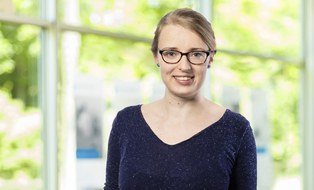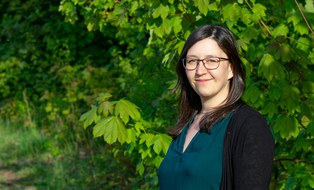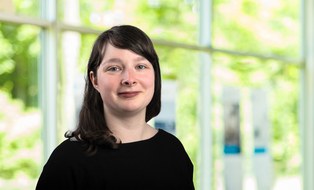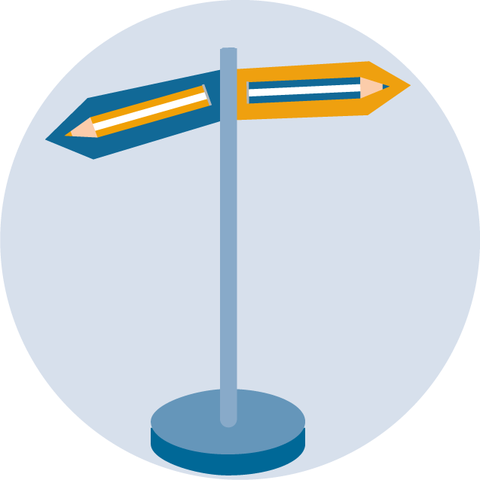21.08.2023
Steile These: Wie KI das Schreiben verändert - 6 Thesen aus dem SZD
Seit im November 2022 die KI-basierte Anwendung ChatGPT online ging, ist die Aufregung darum in der wissenschaftlichen Community kaum abgeebbt. Auch am SZD gehen die Meinungen auseinander: Werden durch generative KI-Systeme etablierte Konzepte wie Autor:innenschaft erschüttert oder handelt es sich bloß um den sinnbildlichen "Taschenrechner" zum Schreiben? Sind Kompetenzverluste in Bezug auf kritisches Denken und Selbstmanagement zu befürchten oder kann KI sogar Bildungsungerechtigkeiten ausgleichen? Und was bedeutet der Einsatz von KI beim Schreiben für disziplinübergreifende Forschung?
Die SZD-Mitarbeiter:innen Betty, Claudia, Paulina, Sharon, Theresa und Tobi verraten, was ihre Steile These zur Nutzung von KI-Technik beim wissenschaftlichen Schreiben ist.
Der Autor* ist tot - schon wieder.
Aber diesmal anders. Die Bereitwilligkeit, mit der wir kollektiv maschinelles Ghostwriting akzeptieren (wobei man fragen könnte, ob der Großteil dahingehend eine bewusste Entscheidung getroffen hat oder schlichtweg mit der Pistole des technischen Fortschritts auf der Brust die Hände hochnimmt), ist eine Beleidigung für diejenigen, die in einem jahrelangen Prozess ihre Fähigkeiten in der Kulturtechnik des Schreibens perfektioniert haben.
Mir ist bewusst, dass Werkzeuge wie ChatGPT für viele Menschen, die nicht gern schreiben, denselben Nutzen haben, wie für mich digitale Bibliothekskataloge und Tabellenkalkulationsprogramme. Insofern ist dies keinesfalls eine Forderung, den Einsatz von generativen KI-Systemen beim Schreiben zu verbieten. Dies ist vielmehr ein Plädoyer gegen die Abwertung menschlicher Kreativität und Schaffenskraft zugunsten kommerzieller Interessen. Ein Plädoyer dafür, angesichts der hochspannenden technischen Entwicklung kurz innezuhalten, um neu zu definieren, was Autor:innenschaft überhaupt bedeutet. Und, über den Tellerrand der Wissenschaft hinausschauend zu fragen: Was ist uns menschengemachte Kunst wert?
*die Autorin auch
 © Crispin-Iven Mokry
© Crispin-Iven Mokry
ehemalige Referentin für Schreibdidaktik
NameSharon Király
Eine verschlüsselte E-Mail über das SecureMail-Portal versenden (nur für TUD-externe Personen).
Schreibzentrum der TUD
Schreibzentrum der TUD
Besuchsadresse:
Fritz-Foerster-Bau Mommsenstr. 6
01069 Dresden
Postadresse:
Technische Universität Dresden
Zentrum für Weiterbildung
Schreibzentrum
01069 Dresden
KI-Tools wie ChatGPT werden das Schreiben unterstützen wie Taschenrechner das Rechnen
So wie sich mit jeder neuen großen Erfindung Lese-, Schreib- und Erzählpraktiken geändert haben (z. B. mit der Gutenbergpresse für den Buchdruck), wird künstliche Intelligenz das Schreiben (und Lesen?) verändern. Wenn wir also KI fürs Schreiben nutzen werden wie Taschenrechner fürs Rechnen, handelt es sich meiner Ansicht nach dabei lediglich um eine Verschiebung von Fertigkeiten: So wie ein Taschenrechner für komplexe Aufgaben entsprechend bedient und die Ergebnisse eingeordnet werden müssen, werden auch KI-Tools für wissenschaftliche Schreibaufgaben entsprechend bedient und ihre Ergebnisse überprüft und eigenordnet werden müssen. Wo an der einen Stelle mithilfe von Technik Zeit eingespart wird (z. B. in der Recherche), wird ihre Nutzung an anderer Stelle mehr Zeit erfordern (z. B. bei der Überprüfung von Informationen und Textüberarbeitung). Und so wie wohl niemand mehr den Taschenrechner fürs Rechnen missen möchte, werden wir wahrscheinlich auch auf KI-Tools zur Unterstützung im Schreibprozess irgendwann nicht mehr verzichten wollen.
 © Crispin-I. Mokry
© Crispin-I. Mokry
Referentin Schreibdidaktik
NameClaudia Hammermüller
Angebote für Studierende | Projektbegleitung
Eine verschlüsselte E-Mail über das SecureMail-Portal versenden (nur für TUD-externe Personen).
Schreibzentrum der TUD
Schreibzentrum der TUD
Besuchsadresse:
Fritz-Foerster-Bau Mommsenstr. 6
01069 Dresden
Der Einsatz von KI zum Verfassen wissenschaftlicher Texte lässt die Fähigkeit zum kritischen Denken verkümmern
Das Verfassen wissenschaftlicher Texte ist nicht nur als das bloße Aufschreiben von Gedanken zu verstehen, sondern trägt maßgeblich dazu bei, eigene Gedanken zu entwickeln, zu schärfen und mit ihnen zu argumentieren. Der Formulierungsprozess hilft Schreibenden, sich klar zu werden, was gesagt werden soll. Es wird kritisch gedacht, hinterfragt – und darüber Erkenntnis gewonnen. Dieser Prozess ist anstrengend – und wird daher auch von den Schreibenden als beschwerlich empfunden. Die KI erleichtert Schreibenden den Denk- und Schreibprozess, indem sie ihnen von der Themeneingrenzung bis zur Überarbeitung des Textes Aufgaben abnimmt. Und wer verzichtet nicht gern auf anstrengende Tätigkeiten? Insbesondere wenn die KI am Ende so gut gelernt hat, dass ihr keine Ergänzungen, Anmerkungen entgegengesetzt werden können? Im Resultat wird kritischen Denken für das Schreiben wissenschaftlicher Texte überflüssig.
Referentin Schreibdidaktik
NameDipl.-Ing. Theresa Beerbaum
Eine verschlüsselte E-Mail über das SecureMail-Portal versenden (nur für TUD-externe Personen).
Schreibzentrum der TUD
Schreibzentrum der TUD
Besuchsadresse:
Fritz-Foerster-Bau, Raum 108 Mommsenstr. 6
01069 Dresden
Wer „schummelt“, lässt eine Gelegenheit zum Kompetenz- und Wissenserwerb verstreichen!
Beim wissenschaftlichen Schreiben an Universitäten geht es weniger darum, ein sprachlich perfektes Textprodukt zu erschaffen. Viel mehr dient das Verfassen von Seminar- und Abschlussarbeiten dem Erwerb von Fachwissen und Kompetenzen. Wer eine (vermeintliche) Abkürzung nimmt – z.B. durch die Nutzung von ChatGPT – wird persönlich weniger vom Schreibprozess profitieren als jemand, der dies nicht tut. Denn: Fachtexte selbst zu lesen, ihre Inhalte und Strukturen zu erfassen, darauf aufbauend eigene Ideen und Argumente zu entwickeln und diese sprachlich präzise zu formulieren, ist ein anspruchsvolles Vorhaben. Wer sich der Herausforderung stellt, wird belohnt werden - mit Wissenszuwachs sowie verbesserten Lese-, Schreib- und Selbstorganisationskompetenzen.
 © Franz Mäge
© Franz Mäge
Wissenschaftliche Hilfskraft
NameBettina Damnik
Schreibberatung, Workshops
Eine verschlüsselte E-Mail über das SecureMail-Portal versenden (nur für TUD-externe Personen).
KI als individueller Lern- und Schreibtutor kann Bildungsungerechtigkeiten auffangen
KI als Lernbegleiter? Na klar! Und das hilft auch beim Schreiben? Auf jeden Fall!
Mit dem einfachen und aktuell häufig noch kostenlosen Zugang zu vielen KI-Anwendungen können diese beim Lernen und Schreiben unterstützen. Dabei kann die KI Quizfragen, Beispiele und Anwendungsaufgaben liefern; sie kann Argumente überprüfen und mit Gegenargumenten kontern. Beim Schreiben können KI-Anwendungen Textpassagen umformulieren und Stichpunkte zu ganzen Sätzen ausformulieren. Es können Rückfragen gestellt werden, um Sachverhalte neu und anders zu betrachten – so lange, bis keine Frage mehr unbeantwortet ist. Und all das machen KI-Anwendungen, ohne die Augen zu verdrehen oder den Lernenden ein schlechtes Gewissen wegen ihrer „dummen Fragen“ zu machen.
Ein großer Vorteil ist auch, dass sich das Lernen so in jedem Fall an die Geschwindigkeit der Studierenden anpasst und so u.a. dazu beitragen kann, Bildungsungerechtigkeiten auszugleichen, die im Unterricht oder im Seminar nicht beachtet werden (können). Die KI-Anwendung hat Zeit für alle Fragen, zu jeder Zeit und in jedem Umfang.
 © Sven Ellger
© Sven Ellger
Referentin für Schreibdidaktik
NamePaulina Hösl M.A.
Projekt sTUDy smart, Expertin für KI-gestützte Schreibprozesse
Eine verschlüsselte E-Mail über das SecureMail-Portal versenden (nur für TUD-externe Personen).
Schreibzentrum der TUD
Schreibzentrum der TUD
Besuchsadresse:
Fritz-Foerster-Bau, Raum 108 Mommsenstr. 6
01069 Dresden
Der Einsatz von KI-Modellen bei der Textgenerierung wird in den Natur- und Geisteswissenschaften sehr unterschiedlich Anwendung finden, was disziplinübergreifende Forschung zusätzlich erschweren könnte.
Wissenschaftliche Texte in den Geisteswissenschaften unterscheiden sich (neben anderen Kriterien) in Wortwahl, Formulierung und Satzbau stark von jenen aus den Naturwissenschaften. Die pointierte, selten verschachtelte und je nach Fach sogar weitestgehend standardisierte Sprache der Naturwissenschaften lässt sich für Forschungsanliegen der Geisteswissenschaften nicht ohne Weiteres übernehmen, da diese oft mit Interpretationen arbeiten, die einen differenzierteren Sprachgebrauch erfordern.
Insofern kann die Entwicklung eines charakteristischen Sprachstils für Autor:innen in diesen Wissenschaftsbereichen auch als Mittel zur eigenen Profilierung dienen. Beispielsweise erkennt man manche Geistenwissenschaftler:innen wie Luhmann oder Habermas mit ihrer spezifischen Art des Formulierens meist schon in den ersten Zeilen eines Textes. Jetzt kann man darüber streiten, ob das dem übergeordneten Ziel der Wissensgenerierung dienlich ist; ungeachtet dessen ist bislang aber fraglich, ob sich durch den vermehrten Einsatz von KI-Schreibtools überhaupt vergleichbar markante Sprachstile herausbilden könnten. Wahrscheinlicher ist, dass die häufigere Nutzung von statistischen Large-Language-Modellen in wissenschaftlichen Schreibprozessen mit einer Nivellierung der Wissenschaftssprache einhergeht. Was in der Naturwissenschaft wohl begrüßt werden dürfte, sorgt in der Geisteswissenschaft eher für Bauchschmerzen. War eine Zusammenarbeit zwischen den beiden Wissenschaftsbereichen bisher nur äußerst selten zu beobachten, so wird die Diskussion um den Einsatz von KI im Wissenschaftsprozess dieses Vorhaben vermutlich nicht erleichtern. Wie groß oder eben wie unterschiedlich die Auswirkungen von KI-Technologie auf wissenschaftliche Konventionen aber tatsächlich ausfallen, bleibt weiter abzuwarten.
 © Sven Ellger
© Sven Ellger
Wissenschaftliche Hilfskraft
NameTobias Dittrich
Schreibberatung, Evaluation, Unterstützung Workshoporganisation
Eine verschlüsselte E-Mail über das SecureMail-Portal versenden (nur für TUD-externe Personen).
Zum Weiterlesen:
Limburg, A., Bohle-Jurok, U. , Buck, I., Grieshammer, E., Gröpler, J., Knorr, D., Mundorf, M., Schindler, K., Wilder, N. (2023). Zehn Thesen zur Zukunft des wissenschaftlichen Schreibens. Diskussionspapier Nr. 23. Berlin: Hochschulforum Digitalisierung.
Dieser Beitrag erschien anlässlich des Schreibzentrumsnewsletters im August 2023. Diese und weitere Newsletterausgaben sind im Newsletter-Archiv des Schreibzentrums verlinkt.
 © TUD
© TUD
Schreibzentrum der TUD
Eine verschlüsselte E-Mail über das SecureMail-Portal versenden (nur für TUD-externe Personen).
Besuchsadresse:
Fritz-Foerster-Bau, Raum 108 Mommsenstr. 6
01069 Dresden
Postadresse:
Technische Universität Dresden
Zentrum für Weiterbildung/
Schreibzentrum der TUD
01062 Dresden
Das Schreibzentrum der TU Dresden (SZD) unterstützt Studierende und Lehrende mit Angeboten zum Planen und Schreiben verschiedener Texte im Studium wie Belege, Protokolle, Seminar- und Abschlussarbeiten und zur Vermittlung des akademischen Schreibens in Lehre und Betreuung. Alle Informationen zu Angeboten und Möglichkeiten der Unterstützung sind in den Bereichen für Studierende und Lehrende zu finden.

